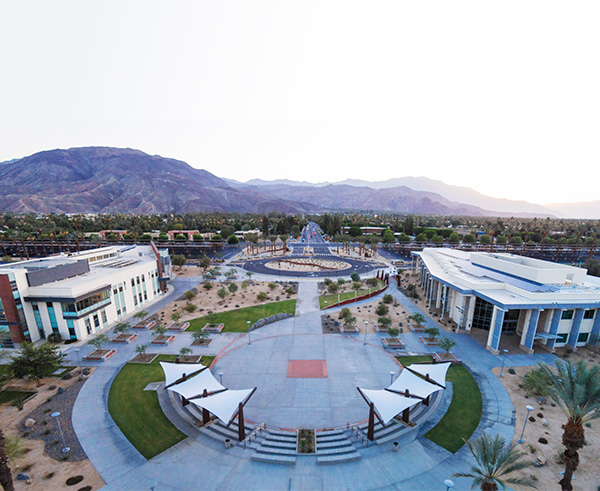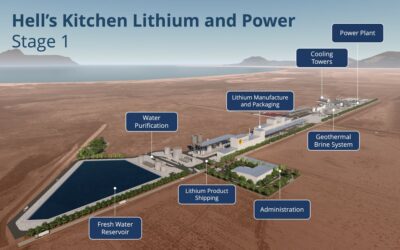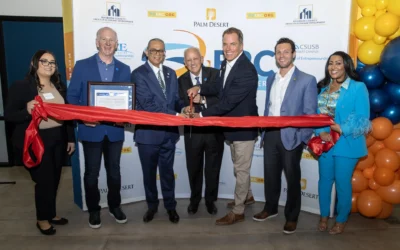At the Coachella Valley Economic Partnership’s (CVEP) annual economic summit, held at the Agua Caliente Casino Resort & Spa in Rancho Mirage on November 19, College of the Desert (COD) President Laura Hope delivered a powerful presentation outlining the institution’s profound impact on the region. With COD playing a vital role in both the economic development and social mobility of the Greater Palm Springs area, Hope’s address illuminated how the college serves as a catalyst for opportunity and transformation.
A Catalyst for Economic Growth
According to the college’s most recent economic impact analysis, COD’s economic contributions to Greater Palm Springs are immense. In the 2021-22 fiscal year, COD generated $378.1 million for the regional economy and supported 5,114 jobs. An additional $255.7 million was contributed by COD alumni who remain active in the local workforce. With 125,000 alumni working in fields such as healthcare, public safety, service jobs, and business, the ripple effects of the college’s work are felt across industries.
The return on investment for students and taxpayers underscores COD’s value. For every dollar invested in education at COD, students see a lifetime return of $52.60, while taxpayers receive $10.70 for every dollar spent. “Our work isn’t just about education – it’s about saving lives and building futures,” Hope emphasized during her presentation. “We save lives.”
Workforce Development: Meeting Regional Needs
COD has tailored its academic and technical programs to meet the valley’s evolving workforce demands. Notable programs include the renowned nursing curriculum, which recently expanded its capacity by 30 seats, enabling 80 students to graduate annually. COD’s Public Safety Academy also continues to produce skilled first responders through training in fire technology, police science, and emergency medical services.
The forthcoming Roadrunner Motors facility in Cathedral City will further enhance COD’s workforce training capabilities. Scheduled for completion in 2025, the 25,000-square-foot automotive center will prepare students for high-demand technical careers in the automotive industry. It will accommodate up to 100 students in a cohort-based model.
Meanwhile, COD is making strides in hospitality and culinary arts. The highly anticipated Palm Springs campus, which recently celebrated its ceremonial groundbreaking, will focus on these areas while offering innovative architecture programs, digital media, and media programs. One of the campus’s standout initiatives is a bachelor’s degree in casino management, developed in collaboration with the Agua Caliente Band of Cahuilla Indians. This program will be the first in the nation to incorporate tribal sovereignty into its curriculum, reflecting COD’s commitment to cultural inclusivity and innovation.
Long-awaited by the community, this campus will be a state-of-the-art facility designed to serve the region’s unique economic and educational needs. In addition to programs in hospitality and culinary arts, the campus will offer specialized courses in digital media and a cutting-edge casino management degree.
President Hope emphasized the campus’s broader significance: “This isn’t just about building classrooms; it’s about building futures.” The project promises to generate economic activity during its construction phase and, once completed, provide a hub for workforce training and innovation.
Expanding Opportunities Across the Valley
Beyond Palm Springs, COD is investing in its Indio campus, which will double its capacity by 2025, adding 100,000 square feet of learning space. These expansion efforts are critical for meeting the needs of the valley’s growing population.
COD’s broader capital projects include the recently completed Child Development Center in Indio, which created $50.2 million in local economic activity during construction and will contribute $4.85 million annually. The center provides 45 new living-wage jobs, 36 of which are designated for low-income residents, further emphasizing COD’s commitment to equitable growth.
A Commitment to Social Mobility
President Hope’s presentation underscored COD’s dedication to addressing social challenges and barriers. With more than 70% of COD students being first-generation college attendees and 78% relying on financial aid, the college is committed to making higher education accessible and affordable.
Programs like the Power Five initiative exemplify COD’s innovative approach. Initially designed to secure internships for students from five businesses, the program quickly grew to include 44 participating companies. Students gain paid work experience, earn college credit, and develop professional networks – a crucial steppingstone to long-term success.
COD’s Rising Scholars Network extends its impact to the Indio Juvenile Justice Center, where 50 young men will receive an in-person college education. This program aims to reduce recidivism and provide individuals with the tools to rebuild their lives through education.
Meeting Basic Needs with Dignity
Recognizing the challenges many of its students face, COD has prioritized addressing food insecurity. COD provides weekly food distributions through its food pantry and partnerships with organizations like College Corps while enabling students to earn tuition funds through volunteer service. “We ensure our students not only have access to food but also dignity and support,” Hope said.
Innovative Partnerships: Bridging Education and Industry
COD’s success is deeply rooted in its collaborations with local businesses and organizations. Partnerships with Toyota of the Desert and Renova Energy have bolstered automotive technology and renewable energy training programs. COD’s collaboration with STEM mentors led to the receipt of an M-Star Grant from NASA, expanding opportunities for students in science and technology.
Additionally, COD is exploring creative industries through initiatives like an AI-driven film project in collaboration with the city of Palm Springs. By equipping students with cutting-edge skills, these partnerships enhance COD’s curriculum and position Greater Palm Springs as a hub for innovation.
A Shared Mission for Transformation
President Hope’s message at the CVEP summit was clear: COD’s success is deeply intertwined with the support of its community. From public funding and philanthropic contributions to partnerships with businesses and local governments, COD thrives through collective effort.
“Education transforms lives, but only when supported,” Hope said. Her words reflect COD’s enduring mission to create opportunities, uplift communities, and drive economic growth.
COD remains a cornerstone of its progress as the Greater Palm Springs region evolves. Through innovative programs, impactful partnerships, and transformative expansion projects, COD continues to shape a future defined by growth, inclusion, and opportunity. For the Coachella Valley, College of the Desert is not just a college – it is a beacon of hope and a foundation for success.




